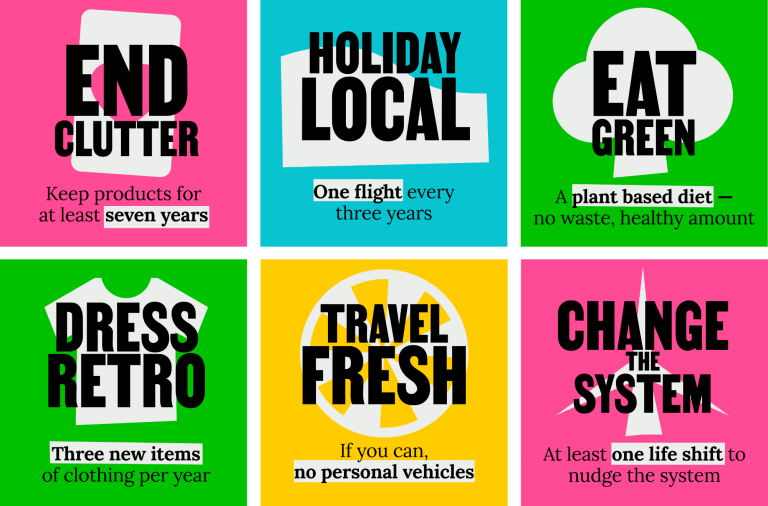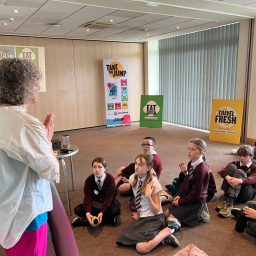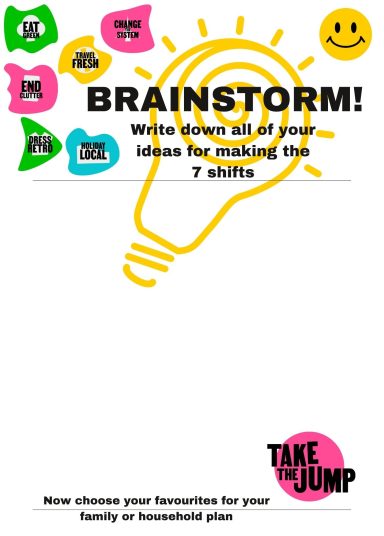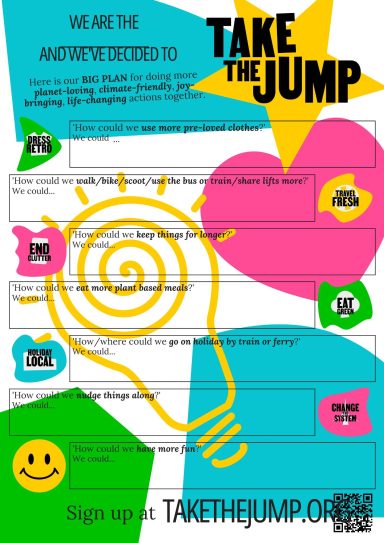


Elmbridge Junior Citizen Event 2025. Almost 1000 year 6 pupils and their teachers heard about Take the JUMP with Oxshott Net Zero

With Danes Hill School Eco-Committee


Explaining the Greenhouse Gas effect - the sun beaming down on the earth covered in blankets!

Stall at the Thames Ditton Nature and Climate Festival


The children played a game to guess which Take the JUMP shift made the most impact. Read all about the event here

Talk for Green Elmbridge about Take the JUMP at the Riverhouse Barn, Walton
What is Take the JUMP?
Try these 6 shifts for 1, 3 or 6 months to Take the JUMP
Take the JUMP is for anyone worried about the state of nature but who may not be sure about how they can make a difference. It describes six shifts in the everyday choices we make to live in balance with the earth's resources and avoid ecological breakdown.
It is based on research from the University of Leeds, Arup and C40 Cities. For the first time this research has shown the importance and power of individual actions in addressing climate breakdown. It identified the most important changes which individuals can make to limit emissions to stay within agreed safe levels.
The approach is open and encouraging - start where you are and do what you can to work towards these shifts. Nobody is perfect but we can all take a further step to protect our planetary home. The approach is also positive. We are so immersed in a culture of consumption that we may not notice other, more satisfying ways to live and to relate to one another and to the world. Taking the JUMP invites you to explore a life of less stuff and more joy.
According to the research, we need a 2/3 reduction in greenhouse gas emissions from consumption by 2030 to stay within the internationally agreed limit of 1.5 degrees warming. 27% of this 2/3 reduction is primarily down to individual behaviour with the other 73% being down to governments and businesses.
This decade is crucial to stay within that limit. Big businesses and governments are not as agile as individuals in changing their behaviour and their systems. The impact of individual behaviour can be immediate and is therefore particularly important in these few years until 2030 after which some of the bigger infrastructure changes will start to filter through.
What Take the JUMP has clarified is that individual behaviour is important and that if enough people who are able to do so make these changes, then the impact is significant.
Keep scrolling to find out more about how to approach the JUMP and more details about each of the 6 shifts.
Sign up at the Take the JUMP website to try the shifts for 1, 3, or 6 months and join the local Whatsapp group to get support and ideas from neighbours who are taking the JUMP. You can find lots of resources and help on the Take the JUMP website plus details of drop-in friendship and support groups and training to encourage you having a go at Taking the JUMP!
Print off our planning sheets to Take the JUMP with your family or household. Click the images below.
Nobody is perfect, it's enough to just start :)
Here are some helpful tips for how to approach Taking the JUMP
TRYING IS ENOUGH, so just start
Even if you can't keep to it 100% you can still Take the JUMP and do your best. If it feels too much, start with what you can and keep building.
NO MORE
us and them
NO SHAMING! Change isn't easy, so be kind. Talk about what makes it difficult. Build each other up. Laugh at our flaws. Welcome all hypocrites. Be humble - we can all do more.

TAKING THE JUMP will change things.
By finding alternatives to a mindset and culture defined by consumerism, we get a glimpse of what the future could really look and feel like. Once 25% of a society starts to behave in a certain way, cultural shifts follow as opinions reach a tipping point. This is how all big cultural shifts have come about such as women's suffrage or the abolition of slavery.
JUMP FOR JOY
Taking the JUMP doesn't mean going back to the stone age, just finding a balance. Less consuming can mean more time for the things which bring quality of life and make our lives more fulfilling. Live for joy, not for stuff.
EQUAL ACCESS
different responsibility
The JUMP is designed to be accessible for ALL people, regardless of background. At the same time, the research shows that those living in relative comfort must Take the JUMP most urgently.
What is End Clutter?
Try to keep electronic products for at least seven years
Every electronic product we buy has emissions associated with it. We need to reduce the amount we buy to help reduce these emissions. The science from the JUMP shows we need to target keeping electronic products for at least 7 years. We are talking especially about phones, tablets and laptops but also all household appliances.
Many people replace items like phones with an upgraded model every couple of years. And this replacement rate extends to many more of the things we fill our lives and homes with.
Apply this principle to other products in your life. Repairing rather than replacing, and not succumbing to adverts that make us think we need the next new thing now! Find a local repair cafe to get your items fixed.
While you try taking the JUMP, why not just try to avoid buying any new electronics over that period? Instead try to repair products, borrow them, rent them, buy second hand, or if you really need something then keep new items to a minimum.


What is Holiday Local?
If you can, reduce personal flights to one short-haul flight every 3 years and one long-haul flight every 8 years.
The sustainable amount to fly is one short haul return flight (destination <1500km) every three years. A long haul return flight is sustainable once every eight years depending on how far you’re flying.
We can still see the world: flying abroad plenty of times over a lifetime, or travelling more slowly overland to different places. But we need to get realistic about the impact of weekend city breaks abroad. Why not visit all the incredible places we have closer to home? These can offer the same relaxation and fun but with none of the stress of international travel.
We typically work hard all year and then go off for a 1 or 2 week holiday, return and straight back to work the next day and repeat. It can feel exhausting. Holidaying locally allows us to take more mini breaks or long weekends. Getting away for a few short breaks close by can feel refreshing and can re-energise us.
What is Eat Green?
More than 25% of global emissions arise from the food system
The science behind the JUMP shows that there are 3 changes we can make that will dramatically reduce emissions from the food we eat:
1. Go plant based, or as close as you can Move to a mostly plant-based diet. This means replacing most of the meat and dairy we eat with plant-based alternatives which are lower in overall emissions. The closer to entirely plant-based the better, though not everyone may want to go all the way. The upper limit for meat consumption is 16kg a year (so try a maximum of 300g per week) and 90kg of dairy (so try a maximum of [1.7kg per week), however it is much better to aim for closer to none. While on the JUMP try to eat an entirely plant-based diet.
2. Don’t waste food (and money) Make sure that you eat everything that you buy. This means not throwing food away. If we stop wasting food entirely (or as close as possible) it means we can avoid wasting all the resources and emissions associated with producing that food and getting it on your plate. An added bonus is that we can also save money!
3. Eat healthy portions Eat healthy amounts This means not eating excessively. The ‘healthy amount’ of food will be completely personal for each person, body type and level of physical activity, so find what feels right for you.
.


What is Dress Retro?
Try to only buy 3 new items of clothing per year
Every item of clothing we buy has emissions associated with it. We need to reduce the amount we buy to help reduce these emissions. The science behind the JUMP shows we need to target keeping to 3 new items of clothing per year. Don't worry! This doesn't include socks, underwear or shoes!
But this doesn't mean you can't change your wardrobe and look fabulous! You could buy second hand, recycled or refurbished clothes. You could rent, share or swap clothing.
While you are taking the JUMP you could try to avoid buying anything new at all for that period (typically 1, 3 or 6 months) or just buy 1 new item.
What is Travel Fresh?
As far as possible, do not use personal vehicles
The manufacture and use of every vehicle has emissions associated with it. We have to reduce this impact to help reduce these emissions. The science behind the JUMP shows we need to target getting rid of personal vehicles if we can.
In the UK, over 60% of journeys of less than 2 miles were made by motor vehicles in 2018. A 2 mile journey takes around 10 minutes to cycle - without breaking a sweat!
Of course there are exceptions to this. Some people are disabled, or may live in remote areas, so need a car to get about.
While you are taking the JUMP, see how many car journeys you can replace with something else over the JUMP period.


What is Change the System?
Nudging the system speeds up change
The science behind the JUMP has identified that individuals have primary control over 27% of the 2/3 reduction in emissions which is required by 2030 to avoid climate breakdown.
That leaves 73% being the responsibility of government and businesses. Making shifts such as changing energy provider or writing to your MP; supporting an environmental charity or insulating your home; changing your bank account or your pension provider will all help to accelerate change.
Once 25% of a population are in favour of something, according to sociological studies, opinions reach a pivot point and society starts to change. Talking to friends and neighbours about what your are doing is another way to Change the System by letting people know.
Oxshott Net Zero
smaller footprint, brighter future
We need your consent to load the translations
We use a third-party service to translate the website content that may collect data about your activity. Please review the details in the privacy policy and accept the service to view the translations.



